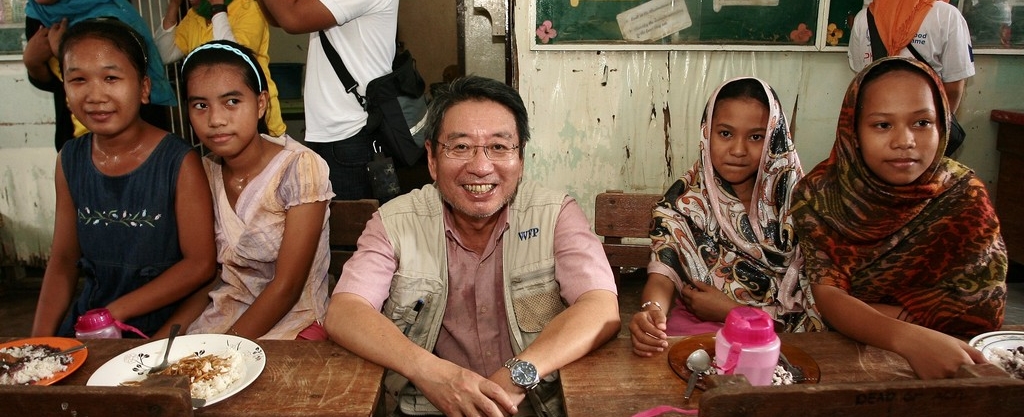
The Worldview Project is delighted to announce that the distinguished former director of the World Food Programme for Asia, Kenro Oshidari, will deliver a talk on Thursday, August 5 at 7:00 PM (PT). The following is an overview of his remarkable career with the U.N. and more about the World Food Programme.
Kenro Oshidari grew up in Tokyo with a culture-spanning worldview. His father was born in the United States and attended college at the University of the Pacific, but moved to Japan after graduation. Kenro attended Nishimachi International School, where he met the children of expatriates from all over the world. Later Kenro attended the American School in Tokyo.
Kenro came to the United States to attend college at his father’s alma mater. He was a student at Callison College, a program that offered a single degree in cross-cultural studies. That is where I met Kenro, as a dorm-mate and housemate several times over. We have stayed in touch over the years and get together whenever he visits California. I can say without a doubt, he is the best of us.
Students at Callison spent their sophomore year abroad either in Japan or India. However, being from Japan, Kenro opted to go to Taiwan instead. Upon graduating from Callison, he attended the School for International Training in Vermont (made famous in the 1960s with their “Experiment in International Living”) where he obtained a Master’s Degree in International Administration.
Before he finished his degree, Kenro returned to the West Coast where he was hired as a part-time driver for the Japanese consulate. He ended up working in the consul section processing passports and visas. In 1978 a Japanese diplomat visited the consulate and mentioned that the United Nations Development Program was seeking to employ a Japanese bilingual individual with at least a master’s degree. A staff member at the consulate recommended Kenro. The possibility of landing a job with the UN induced Kenro to finish his degree quickly. He got an interview for a position and sometime later he got a call from the UNDP saying he would be hired if he agreed to go to Libya. He jumped at the opportunity even though he wasn’t even sure where Libya was. After this North Africa experience, he landed a position in 1982 with UN-Habitat (an urban development agency) with a head office in Kenya where he spent nearly seven years. But Kenro longed to find work that was more hands-on with more critical immediacy, so he applied for a position at the World Food Programme and was hired.
Kenro first worked with the WFP in Zambia and Lesotho. However, when the Bosnian War erupted in the early 1990s he transferred to Zagreb to help feed refugees who were fleeing the fighting. His work often took him to Sarajevo where the fighting was intense, requiring him to sleep wearing a bullet-proof vest and a helmet and surrounded by sandbags.
After this Kenro was assigned to Cambodia to aid victims of the Khmer Rouge. He then transferred to Rome to work at the WFP’s headquarters, but when the Kosovo War broke out, he returned to the field. There, his house was destroyed by a hand grenade; fortunately he wasn’t home at the time. Given his great success in establishing a robust emergency program starting from scratch in a highly dangerous situation, he was then allowed to choose his next assignment. He opted for a post in Bangkok where he was the Deputy Regional Director for Asia, remaining there for more than 5 years.
Things took a dramatic turn when the Dafur conflict in the Sudan exploded. Kenro became the head of the WFP operations there. Eventually it became the largest WFP operation in the world with a staff of 3,000, one quarter of the entire WFP workforce in the world. It was a massive operation with a goal of feeding over 2 million people displaced by the Darfur conflict plus several million more people in war-torn and impoverished Southern Sudan (before South Sudan became independent). It was dangerous work; scores of their trucks and truck drivers were abducted. Kenro had to negotiate not only with the Sudanese government but also with several armed rebel group leaders in order to provide food relief to Darfurians. Kenro says that the first thing you need to embrace when negotiating, even with the most recalcitrant parties, is that the person sitting across from you is a human being.
During this time I was fortunate enough to spend some time with Kenro when he was taking a break from his work. One of our Japanese interns at the Worldview Project gave me a Japanese Daruma doll. When purchased, the eyes of these dolls are blank, and the tradition is to color in one of the left eye and make a wish. When your wish is fulfilled, you then paint in the right eye. It is believed to be a tradition that embraces the ethic of “never losing heart and never giving up”. People wish for success with exams, for true love, or some other personal goal, but when I asked Kenro what he would wish for, he paused and then simply said, “For all the people of Darfur to be able to return to their homes.”
After three and a half years in the Sudan, Kenro returned to Bangkok in 2009 to become the Regional Director for Asia with the WFP. Initially much of focus of his work was on North Korea which was experiencing extreme food shortages. The WFP also provided support (mostly logistical) for relief efforts in the aftermath of the Fukushima earthquake in Japan, a rare instance of a donor nation being the recipient of such aid.
Kenro is a strong adherent to the idea of “do the right thing” even if that means self-sacrifice and bending the rules if absolutely necessary.In Sudan, Kenro had to lay off over 100 security guards, but due to the nature of the contract they had with the WFP, he learned that they would not get any severance pay at the end of their employment. After learning “the HR rules” prevented this, he simply informed the administrators in Rome (rather than asking for permission) and proceeded with the payments. Another time, when he was working on a relief campaign in the Philippines, a typhoon hit, and the drenching rains nearly destroyed one of their warehouses. By UN rules, they were required to get three quotes in order to authorize repairs (which were around $250K). When his staff member (an American named Tommy), told them they only had one quote, knowing any further delay would be catastrophic, Kenro authorized him to proceed, regardless of the rules. To which Tommy replied, “I knew you would say that—they have already begun repairs!”
Kenro retired from the WFP in 2014 and returned to Tokyo shortly thereafter. While retiring gave him more time to play and make music (he is a soulful Jazz bassist and brought his bass nearly everywhere he has gone), he has not been idle. He lectures frequently at universities in and outside of Japan, participates in international conferences and lectures for the yearly “Peace Boat” semester at sea program that travels from South Korea to India. He has a passionate interest in passing the torch to a younger generation, encouraging them to see the world in more global humanistic terms and understands the huge personal benefit of getting involved and doing the “right thing” despite the challenges that lay before you. It’s been a great honor to call him friend for so many decades.
More about the World Food Programme:
The World Food Programme’s mission is “to support food security and nutrition and (re)build livelihoods in fragile settings and following emergencies. Reduce risk and enable people, communities and countries to meet their own food and nutrition needs.” Much of what the organization does is provide food relief to people who are the victims of conflicts or natural disasters. This work entails distributing food assistance and increasingly cash or credit assistance to people who are in desperate need to feed themselves and their families. World Food Programme staff not only work with local and national leaders to provide food assistance, they work directly with the recipients of such aid through their deep field presence within the countries where they operate. Logistics in distributing food in such situations are often exceedingly complex and, in some situations, extremely dangerous.
Most of the food the WFP distributes is obtained by the WFP through cash or in-kind donations of “donor nations”. The largest donations are from the US, Germany, the UK, the European Commission, Saudi Arabia, the UAE, Canada, Sweden and Japan but corporations, foundations, private donors and a plethora of other nations also make significant contributions. Due to the COVID-19 pandemic and the war in Yemen, need has been increasing, putting a strain on the organization resources and capabilities.
The WFP work is not limited to food assistance. The WFP has programs for sustainable development for small farmers, re-forestation projects, early warning and preparedness programs related to climate change, and early childhood nutrition programs in homes and schools. Increasingly direct cash assistance to recipients has allowed greater food choices as well as adding to local food production and improving the sustainability of retail and financial systems. Some WFP programs employ cutting-edge technologies, such as the use of drones in Ethiopia for flood mapping, the use of a block-chain system for iris-scans to enable non-cash purchases for Syrian refugees in Jordan, and H2Grow hydroponics to grow food in the Algerian desert. One of their newest initiatives is to address the global problem of food waste.
One aspect of the WFP’s work is to proactively prevent parties in conflict from using hunger to further their military objectives. This aspect of their work received global recognition when in 2020 the World Food Programme was awarded the Nobel Peace Prize with the prize committee stating that the WFP “was a driving force in efforts to prevent the use of hunger as a weapon of war and conflict.”









